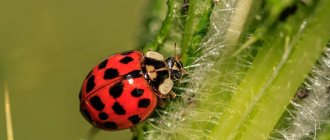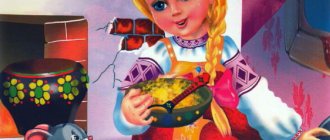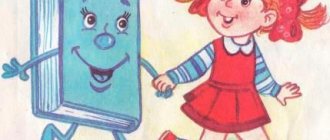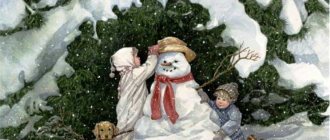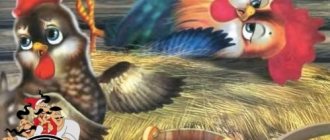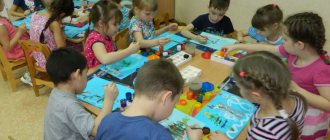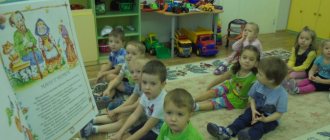Fairy tale
Once upon a time there lived a Little Ladybug in a sunny meadow, and she was so forgetful, carefree... No matter what she was asked, she forgot about everything, was distracted, did not care and did not help. Her mother will send her grandparents to visit, and she will look at the chamomile meadow, doze off on the flower, and wake up when it gets dark and fly home, forgetting about her mother’s request and about her relatives. The only thing she did not forget about was to admire herself and her back, bright red with black spots, in the mirror every morning.
And then one morning Mom says to Little Ladybug: “Tonight we will have guests, we need to treat them with something. Therefore, you need to fly to grandma bee and take some flower honey from her. Just don’t forget under any circumstances, don’t get too carried away, don’t get distracted by anything.” “I won’t forget, mom,” answered Little Ladybug.
And the mother, knowing her daughter, decided to tell her a legend about how naughty, forgetful and uncaring ladybugs lose spots on their backs. But Little Ladybug interrupted her mother and did not let her finish the story, saying: “I told you I won’t forget...” and flew away.
All the way Little Ladybug repeated to herself: “We must not forget, we must not forget, we must not forget...”, but suddenly she met her friends who were playing tag, flying from leaf to flower, from flower to blade of grass. They invited Little Ladybug to play with them. She thought: “What could happen if I play for half an hour…”, she agreed and started playing. When the sun began to set behind the horizon, all the girlfriends scattered to their homes, and Little Ladybug remembered that she had to remember something, but she never remembered.
She flew home when it was already dark, the guests had left without being treated to the flower honey. Mom was very upset and offended by Little Ladybug, and when she went to bed, she took red paint and painted over all the black spots on Little Ladybug’s back to teach her a lesson.
The next morning, Little Ladybug went up to the mirror and froze: her back was all red, there was not a single black spot on it. She was confused, upset, sad, and then completely cried, because she loved her spots so much and treasured them so much. And then she remembered the legend that her mother told her the day before and how she interrupted her and did not listen to the end. She was very ashamed and she never dared to approach her mother and find out how the legend ended and how she could get her spots back. Little Ladybug put on her black polka dot raincoat and left the room.
On this day, my mother asked me to fly to the garden where her dad was grazing aphids, take him something to eat and pick up a jar of milk. Little Ladybug silently agreed, smiled through force, pretended that nothing had happened and flew to her dad. On the way she met her friends again, but refused to play with them, flying past a chamomile meadow she didn’t even look at the flowers, and when she arrived in the garden she didn’t play with aphids, but immediately flew up to her dad, fed him, chatted, took the milk and went home to mom. She was very tired from such a long journey and when she arrived home she immediately lay down and fell asleep. Mom felt sorry for Little Ladybug, because she fulfilled today’s request and wiped off the paint from one spot.
Morning Little Ladybug woke up, sadly walked up to the mirror and a smile immediately appeared on her face - there was a bright black spot on her back! She put on her raincoat and joyfully ran to her mother. “Mom, mom - how can I help you?” - Little Ladybug asked without waiting for requests. On this day, her mother asked her to simply collect nectar from peonies growing nearby. Little Ladybug flew out of the house at that very second, she collected full buckets of nectar in a couple of hours and barely brought them home - the mother was very happy and surprised, and when her daughter told her that she also helped the neighbor’s daughter on the peony bush - ladybug to collect nectar for her grandmother, mom was just happy! When Little Ladybug fell asleep in the evening, her mother carefully wiped off all the paint from her back and all her black spots became visible again.
The next day, Little Ladybug woke up very early and immediately ran to the mirror... Her happiness knew no bounds! Since then, Little Ladybug never forgot about what was asked of her, she always helped everyone, took care and did not get distracted from business, and she also realized that first you need to do what you promised, and then have fun.
Ladle
Little helper
Once upon a time there lived a ladybug who treated herself and the world around her with love. Despite the fact that our heroine was small, she never considered her height, weight and size to be some kind of terrible disadvantage. She always said: “I do everything in my power, and I have enough strength to make this world a better place!”
Ladybug was a caring creature. She helped her planet in any way she could. If I saw pieces of garbage somewhere, I removed them, thereby cleansing my native land. If I saw that a flower was drying up, I would definitely carry dewdrops for it until it got drunk and came to life again.
If someone needed her help and she could help, she was always happy to do so. Because she knew that the planet was her home, and the cleaner and happier it was, the more joyful and pleasant it would be for our ladybug to live in the world.
One day, a ladybug got caught in heavy rain and got its wings wet. They were so wet and heavy that she couldn’t even move. After several unsuccessful attempts to take off, our heroine quietly cried from powerlessness. Suddenly a little caterpillar heard her and asked the ladybug:
- Why are you crying? Maybe I can help you with something?
“My wings are wet, and I can’t move,” the ladybug answered, sobbing.
Then the caterpillar picked up a dry leaf from the ground and wiped the ladybug with it, and then covered it with another leaf to keep it warm. When our heroine’s wings dried up, she was very happy and thanked her savior from the bottom of her heart. And the caterpillar only told her:
- Nature is also grateful to you for your work. You always helped us all, so no one would leave you in trouble.
Since then, the ladybug realized that her kindness and indifference always return to her in an even greater size. Now she took care of the world around her with even more enthusiasm and love, despite her weight and size. After all, everyone can do something good for the planet that they can do!
Source
Sandwiches “Ladybugs”
You will need:
Sliced loaf Red fish (salmon, trout, pink salmon, salmon) Butter Tomatoes Pitted olives Parsley
Preparation:
1. Separate red fish from bones and skin, cut into thin slices. 2. Take a loaf, cut each sliced loaf in half. 3. Brush each half of the slice with butter. 4. Place a piece of red fish on top. 5. Take tomatoes and cut them in half. Cut each half halfway until you get ladybug wings. 6. Make the head of a ladybug using an olive cut in half. 7. Make spots for the ladybug using finely chopped pieces of olives.
8. Place the ladybugs on the red fish and garnish with a sprig of parsley! Tasty and beautiful!
“Ladybug” educational activity for children 3-4 years old in the sensory room
"LADYBUG"
DEVELOPMENTAL ACTIVITY WITH CHILDREN 3 – 4 YEARS OLD
IN THE SENSOR ROOM
Target:
contribute to the creation of a positive emotional mood in a group of children; promote the development of attention, perception, speech and creative imagination of children; promote the development of the ability to feel and understand others; promote the development of coordination of movements, general and fine motor skills, orientation in one’s own body. To cultivate children's ability for coordinated interaction and individual self-expression of children.
Equipment:
tape recorder, phonogram of cheerful, rapid music and birdsong; ball; ladybug toy; flower - mood; magnetic board.
Progress of the lesson
Children, together with a teacher-psychologist, enter the sensory room.
Educational psychologist.
“Guys, look today, guests came to our lesson. Let's welcome them. (Children greet guests). Guys, let's hold hands and make a circle. And let's play the game "Tenderness". I'll look at your faces. Who should I make friends with here? Give your name and affectionate names as they call you at home. (Children take turns saying their names.)
Educational psychologist.
“Dear children, you are the most beautiful in the world. I invite such good, handsome ones to come to the table on which multi-colored petals lie. Please take one piece of paper each and place it on the magnetic board. Thus, we will get one large and multi-colored flower.” (Children come to the table on which multi-colored petals are laid out, they take one petal at a time and lay out a flower - moods - on a magnetic board).
Educational psychologist.
“Guys, look at the multi-colored flower you got. Now let’s sit down on the pillows and talk about what your mood is like. You will take turns passing the ball and whoever has it will tell you what his mood is like. (The children sit down on the pillows, the teacher-psychologist gives the ball to the first child and he begins the exercise. And so on until everyone has spoken out.)
Educational psychologist.
"Well done boys! Everyone’s mood is different, just like our flower has different moods.”
The teacher-psychologist puts a basket in front of the children and takes out a ladybug from it. “Look and tell me who it is?” (Ladybug).
Educational psychologist.
"Right! Look how beautiful she is! Let's say hello to her." (Children look at the ladybug and greet it.)
Educational psychologist.
“Guys, tell me, what shape is a ladybug? (Children's answer).
- What color is her face? (Children's answer).
- What color are her legs? (Children's answer).
- What color is her back? (Children's answer).
- What else does she have on her back? (Children's answer).
- That's right, mugs. What color are they? (Black).
- Let's count the circles on the back. (Children count out loud).
- Well done! Guys, what else does the ladybug have, look? (Children: eyes, mouth, nose).
- Right. Now imagine that our ladybug has flown. Come on, let's try to catch her! (The teacher-psychologist pretends that he is trying to catch an imaginary bug, performs grasping movements above his head: with one hand, the other, both hands at the same time. Children repeat the movements after the teacher).
Educational psychologist.
“Let's open our fists and see if we could catch the ladybug. (Children slowly unclench their fists.)
Educational psychologist.
“Here is our bug! Give him both your palms. (Children join their open palms, imagining that they are holding an imaginary bug.)
Educational psychologist.
“Well done! Now I will tell you a nursery rhyme, and then we will learn the movements to it. (The teacher-psychologist tells a nursery rhyme and shows the movements. The children repeat after him).
Ladybug, swaying their palms rhythmically.
Fly to the sky, They make waves with crossed hands.
Bring us bread, They wave their hands at themselves.
Black and white clap their hands rhythmically.
Just not burnt! They threaten with their index finger.
Educational psychologist.
“The ladybug is frozen and cannot fly. Let's warm her with our breath. (Children bring their folded palms to their lips and begin to blow warm air into them.)
Educational psychologist.
“The ladybug is warm, let’s blow it off our palm. (Children open their palms and, as they exhale, blow off an imaginary bug).
Educational psychologist.
“Now, guys, let’s turn into ladybugs ourselves. (The teacher-psychologist says the magic words and shows the movements, and the children repeat after him).
We were spinning around ourselves
And they turned into ladybugs. They're spinning.
Ladybugs, show me yours
Heads, noses, mouths, Show the named parts of the body.
Winged arms, legs, tummies.
Educational psychologist.
"Amazing! And now we will play the game “Ladybugs and the Wind”. The sun is shining, ladybugs are crawling on the leaves and grass. (A recording of cheerful music sounds). (Children crawl on the floor on all fours. As soon as the cheerful music is interrupted by fast-paced music, it means a strong wind has blown).
Educational psychologist.
“A strong, cold wind blew and turned the bugs over. (Children lie on their backs, move their relaxed legs and arms).
Educational psychologist.
“A kind, warm breeze blew and helped the ladybugs turn over. (Children get back on all fours and crawl.) The game is repeated 2-3 times.
Educational psychologist.
“The warm wind blew stronger, lifted the ladybugs into the air and they flew. (Children, imitating the flight of ladybugs, run slowly, smoothly wave their arms and buzz).
Educational psychologist.
“The sparrow is flying! Save yourself, ladybugs! (Children run into the arms of the teacher-psychologist).
Educational psychologist.
“Well done!
Now I suggest you rest a little. Lie down on the carpet, close your eyes and relax. (Quiet, calm music sounds. The teacher-psychologist reads the relaxation complex “Magic Dream”) .
Educational psychologist.
“Guys, now it’s time for us to say goodbye. Let's make a big circle and say goodbye with a smile. Let's say goodbye to the ladybug and our guests. (Children hold hands, form a circle and smile at each other.)
Educational psychologist.
“I feel that your smiles have made everything around me warmer and kinder. Let your smiles shine and delight the people around you like these small, bright and kind ladybugs. (The teacher-psychologist hands out a small ladybug to the children.) Goodbye!
Calm music plays and the children calmly leave the sensory room.
Ladybug Stones
Samodelkin
This craft is very easy to do. You don’t need to have great artistic skills and talents to complete it, so even children can handle it with the help of their parents. Such a bug pebble can decorate a flower pot and simply become an element of interior decor.
For the craft you will need:
smooth oval-shaped pebbles acrylic paints: black, white, red, yellow, dark brown, burnt sienna, yellow ocher brushes: medium and small flat, small round, eyeliner (liner) pencil and sealing varnish Work progress:
1. Make a pencil sketch on the stone, as shown in the figure. Then we outline the contours with black paint using the tip of the brush.
2. Apply a base of white paint to the wings with a small flat brush. The next layers, already colored, will be much brighter from this.
3. Paint the body with some dark brown color (burnt umber works well) and with a lighter color (for example, burnt sienna) add a series of stripes on the brown body. Then highlight the center of each stripe with yellow ochre. Light and shadow are the most powerful tools for making the features of animals clear. The tonal contrast between dark and light areas enhances impact and adds realism to your entire work.
4. Paint the wings in bright colors. You can use orange, made by mixing red and yellow. Apply paint in two layers. Next, paint the black dots on the wings with a small round brush. Do not try to make them completely round; this does not happen in nature. Now you can paint the rest of the stone with black paint.
5. Draw the head (a small circle with white paint). Two white dots for the eyes and an oval for the mouth - that’s the whole face.
6. Now, using a white liner (or just brush No. 1), draw two hook-shaped antennae on both sides of the head. The picture shows where to paint the two extended wings with liner and white paint. Dissolve some white paint in water to create a transparent color. The lower wings that we are drawing now are so transparent that the ladybug's body can be seen through them. Paint the lower wings using a small round brush.
7. Use liner and white to draw veins on the clear wings. Now the ladybug is finished. Cover it with varnish to protect the stone. Change colors to create beetles to your liking.
If drawing still seems difficult to you, then try this simplified version:
Here are more examples of stone painting:
Now we will make a turtle out of stone.
And now the drawing is more complicated.
A fairy tale about a ladybug for children - read online
The fairy tale about the ladybug from the site's author, Yulia Lavrenchenko, tells young readers how important it is to show concern for yourself and the world around you.
This is a story about how each of us can take care of our planet to the best of our ability, regardless of size, money or other parameters. Have a pleasant and useful reading! Author: Yulia Lavrenchenko
Fairy tale for children "Little Helper". Author - Yulia Lavrenchenko
